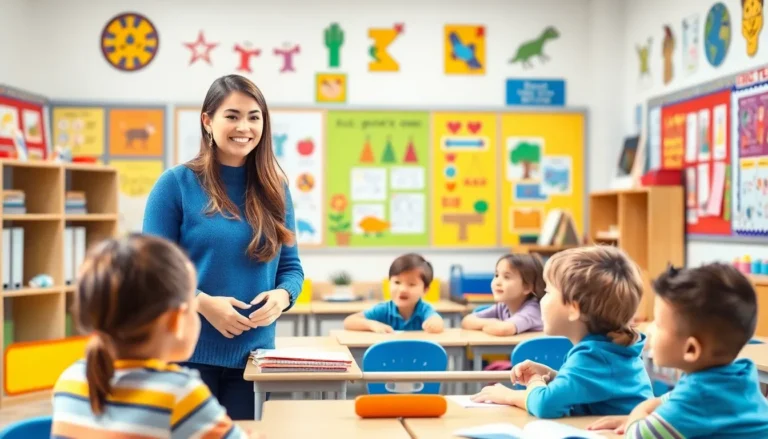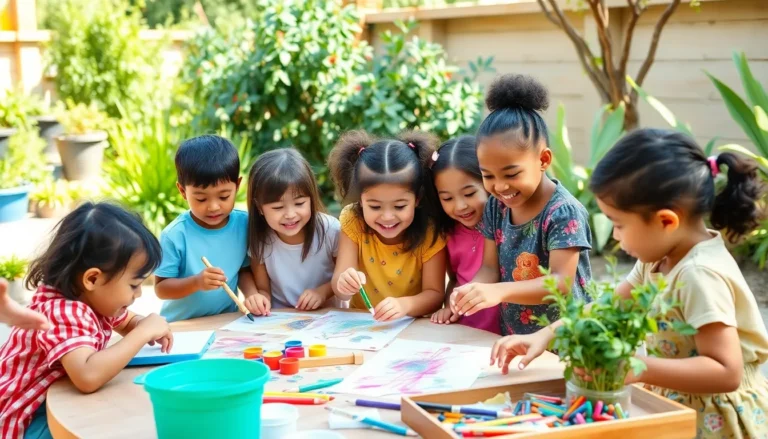In a world buzzing with distractions, mindful Montessori emerges as a refreshing oasis for both kids and parents. Imagine a classroom where children learn not just to read and write, but also to breathe, reflect, and connect with their surroundings. It’s like yoga for the brain, but with a lot more colorful blocks and fewer awkward poses.
Table of Contents
ToggleWhat Is Mindful Montessori?
Mindful Montessori represents an educational philosophy that merges traditional Montessori principles with mindfulness techniques. This approach fosters a supportive learning environment, encouraging children to seek knowledge through self-directed exploration. Each lesson integrates activities that promote awareness, empathy, and emotional regulation.
Children practicing mindful Montessori engage in various activities designed to cultivate focus. These may include breathing exercises that center their thoughts and reflection time that nurtures self-awareness. They also participate in nature walks, which deepen their connection to the environment and stimulate curiosity.
Teachers play a vital role in this framework. They guide rather than direct, allowing students to take the lead in their learning journeys. Observing children closely enables educators to tailor their support, meeting individual needs while fostering a sense of community.
Mindful Montessori classrooms often feature a rich array of materials that encourage hands-on learning. These materials stimulate tactile exploration while reinforcing academic concepts. Real-life objects and purposeful tasks allow children to absorb lessons organically, focusing on intrinsic motivation.
Parents benefit from the mindful Montessori approach as well. This methodology equips families with tools for emotional awareness that extend beyond school. Open communication between parents and educators supports a holistic view of each child’s development while emphasizing shared values of mindfulness and respect.
Overall, mindful Montessori cultivates a harmonious environment where education embraces holistic growth. Children learn to navigate their emotions while building essential life skills within a nurturing framework.
Principles of Mindful Montessori

Mindful Montessori draws from core principles that enhance child development and learning. This approach focuses on cultivating independent, self-aware learners.
Respect for the Child
Respecting the child stands central to the Mindful Montessori philosophy. Each child possesses unique abilities and interests that deserve recognition. This respect fosters an environment where children feel valued and confident. Educators encourage autonomy, allowing children to choose activities that resonate with their curiosity. By acknowledging their emotions and perspectives, teachers nurture a sense of belonging and safety. As a result, children develop resilience and empathy, vital traits for their emotional well-being.
Prepared Environment
Creating a prepared environment is essential in Mindful Montessori. Classrooms feature diverse, interactive materials that invite exploration. Organizing learning spaces with purpose promotes engagement and focus. Each item is chosen carefully to stimulate a child’s natural inclination to learn. Children benefit from access to materials that challenge their skills and foster creativity. Outdoor settings often complement indoor spaces, offering a connection to nature. A well-prepared environment supports independent learning while encouraging mindfulness practices, ensuring children thrive in their educational journeys.
Benefits of Mindful Montessori
Mindful Montessori offers numerous benefits for children’s holistic development. Its emphasis on mindfulness practices cultivates essential life skills.
Emotional Intelligence
Mindful Montessori enhances emotional intelligence through structured activities that promote self-awareness and empathy. Children engage in reflection exercises that encourage them to explore their feelings and understand those of others. Breathing techniques teach them how to manage stress effectively. By identifying emotions in themselves and peers, kids develop stronger social skills. Additionally, classroom discussions invite thoughtful dialogue, allowing children to articulate their thoughts and feelings. This environment nurtures compassionate interactions, encouraging positive relationships with others.
Independent Learning
Independent learning thrives within the Mindful Montessori framework. Children choose activities aligned with their interests, fostering ownership over their educational journeys. The thoughtfully prepared environment is filled with engaging materials, inviting exploration and creativity. As educators guide rather than dictate, students collaborate and share insights with their peers. This approach nurtures critical thinking, enabling children to solve problems independently. Autonomy within learning fosters resilience, encouraging kids to embrace challenges with a positive attitude. Ultimately, each child’s natural curiosity drives their education, promoting lifelong learning.
Implementing Mindful Montessori at Home
Creating mindful Montessori practices at home enhances children’s learning experiences. Parents can transform ordinary spaces into supportive environments that foster exploration and mindfulness.
Creating a Mindful Space
Designating a specific area for mindfulness activities invites children to engage. This space should include comfortable seating and access to natural light. Incorporating calming elements like plants or soft textures encourages relaxation. Various materials, such as sensory toys and art supplies, stimulate creativity and self-expression. Ensuring minimal distractions, like noise or clutter, helps children focus. Parents can also display children’s artwork, reinforcing their sense of accomplishment and self-worth.
Activities to Promote Mindfulness
Engaging in breath awareness exercises is a simple yet effective mindfulness practice. Incorporating guided imagery or visualization can also enhance relaxation. Nature walks encourage children to connect with the environment, heightening their awareness of the world. Other activities, such as mindful eating or journaling, promote reflection and gratitude. Structured breathing exercises, like deep inhalations and slow exhalations, help manage emotions. Parents can facilitate discussions about feelings, creating a safe space for children to express themselves. These varied activities cultivate a holistic understanding of mindfulness.
Challenges and Considerations
Mindful Montessori presents several challenges that educators and parents must address. Time constraints impact the implementation of mindfulness practices in a busy classroom schedule. Teachers often face pressure to meet academic standards, which may conflict with the slower pace of mindfulness activities. Adapting to this balance requires innovative scheduling and support.
Materials play a crucial role in this approach. Schools may lack the diverse resources necessary to create an engaging prepared environment. Limited funding often restricts access to high-quality materials, impacting children’s ability to explore independently. Educators must advocate for additional resources while promoting community support.
Training poses another challenge for educators. Familiarity with mindfulness techniques is essential, yet many teachers may not have the required training. Ongoing professional development opportunities can bridge this gap, providing educators with effective strategies for integrating mindfulness into their lessons.
Maintaining consistent communication with parents is vital. Parents may need guidance on supporting mindfulness practices at home, as different parenting styles can affect cohesiveness. Regular workshops or resources can help families understand the benefits of mindfulness and their role in reinforcing these principles.
Finally, assessing progress in a mindful Montessori environment presents challenges. Traditional assessment methods may not account for emotional and social growth. Implementing holistic assessment strategies is critical, as they better reflect a child’s overall development.
Each of these challenges emphasizes the need for a structured approach. Dedicated support, appropriate resources, and effective communication can create a comprehensive framework. By addressing these considerations, educators and parents foster a sustainable mindful Montessori experience.
Mindful Montessori offers a transformative approach to education that nurtures children’s emotional and cognitive development. By blending Montessori principles with mindfulness practices, it creates an enriching environment where children can thrive. This approach not only fosters self-directed learning but also cultivates essential skills like empathy and emotional regulation.
As educators and parents embrace Mindful Montessori, they empower children to explore their interests and develop resilience. The benefits extend beyond the classroom, promoting a holistic understanding of mindfulness that enriches family dynamics. With thoughtful implementation and open communication, this educational philosophy can significantly enhance children’s learning experiences and emotional well-being, setting them on a path of lifelong curiosity and growth.






